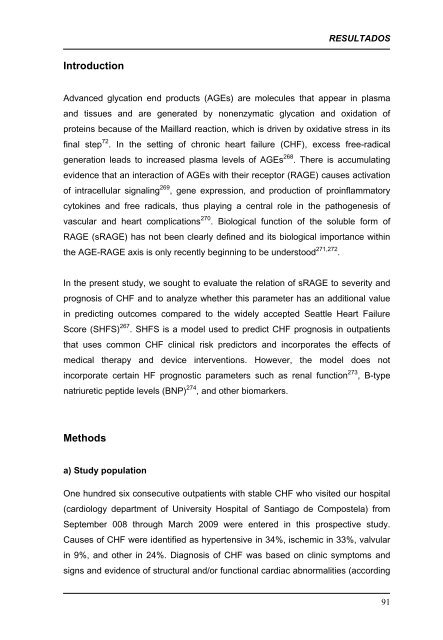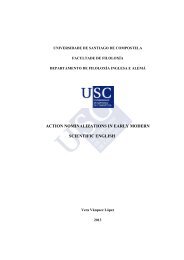- Page 1:
UNIVERSIDAD DE SANTIAGO DE COMPOSTE
- Page 5:
A “Tita”
- Page 9:
LISTA DE ABREVIATURAS AGE: Product
- Page 12 and 13:
4.1.1. VALOR PRONÓSTICO DEL EJE AG
- Page 15 and 16:
INTRODUCCIÓN 1.1. RELEVANCIA ACTUA
- Page 17 and 18:
INTRODUCCIÓN En la actualidad disp
- Page 19 and 20:
INTRODUCCIÓN hereditario (como en
- Page 21 and 22:
INTRODUCCIÓN fibrosis miocárdica
- Page 23 and 24:
INTRODUCCIÓN FEVI conservada, la h
- Page 25 and 26:
1.2.1. PRODUCTOS DE GLICACIÓN AVAN
- Page 27 and 28:
INTRODUCCIÓN Así mismo, en funci
- Page 29 and 30:
INTRODUCCIÓN Adicionalmente, la gl
- Page 31 and 32:
1.2.2. RECEPTORES DE AGE INTRODUCCI
- Page 33 and 34:
INTRODUCCIÓN A semejanza de los re
- Page 35 and 36:
INTRODUCCIÓN adecuada interacción
- Page 37 and 38:
INTRODUCCIÓN nombre de RAGE escind
- Page 39 and 40: INTRODUCCIÓN Se han identificado b
- Page 41 and 42: INTRODUCCIÓN neurodegenerativas, l
- Page 43 and 44: INTRODUCCIÓN modificación por AGE
- Page 45 and 46: INTRODUCCIÓN no se reserva únicam
- Page 47 and 48: 1.3.1. DISFUNCIÓN DIASTÓLICA INTR
- Page 49 and 50: INTRODUCCIÓN izquierdo, medida med
- Page 51 and 52: INTRODUCCIÓN con los de NTpro-BNP
- Page 53: INTRODUCCIÓN 53
- Page 57 and 58: 2.1. HIPÓTESIS HIPÓTESIS Y OBJETI
- Page 59: MATERIAL y MÉTODOS
- Page 62 and 63: CAPÍTULO III relativo de 1,5 (aume
- Page 64 and 65: CAPÍTULO III Sexo. Del total de la
- Page 66 and 67: CAPÍTULO III información disponib
- Page 68 and 69: CAPÍTULO III la hemoglobina glicad
- Page 70 and 71: CAPÍTULO III Ritmo y frecuencia ca
- Page 72 and 73: CAPÍTULO III de 107,2 ± 51,2 mm.
- Page 74 and 75: CAPÍTULO III AGE fluorescente. Med
- Page 76 and 77: CAPÍTULO III Tratamientos. Más de
- Page 78 and 79: CAPÍTULO III de la formación de p
- Page 80 and 81: CAPÍTULO III datos en Microsoft Ac
- Page 83: RESULTADOS
- Page 86 and 87: CAPÍTULO IV 86 Un primer estudio
- Page 89: RESULTADOS Relation of Soluble Rece
- Page 93 and 94: RESULTADOS Mannheim, Germany). Plas
- Page 95 and 96: RESULTADOS 0.007) and kidney failur
- Page 97 and 98: RESULTADOS kidney failure, and fluo
- Page 99 and 100: RESULTADOS A significant direct cor
- Page 101 and 102: RESULTADOS significant delay in cal
- Page 103: 4.1.2. VÍAS PATOLÓGICAS ASOCIADAS
- Page 106 and 107: CAPÍTULO IV Abstract Aims. Knowled
- Page 108 and 109: CAPÍTULO IV associations between t
- Page 110 and 111: CAPÍTULO IV tetramethylbenzidine (
- Page 112 and 113: CAPÍTULO IV 112 TABLE 1. Baseline
- Page 114 and 115: CAPÍTULO IV between patients with
- Page 116 and 117: CAPÍTULO IV 116 TABLE 3. Clinical
- Page 118 and 119: CAPÍTULO IV c) Correlation between
- Page 120 and 121: CAPÍTULO IV have moreover been sho
- Page 122 and 123: CAPÍTULO IV There is increasing ev
- Page 125 and 126: RESULTADOS Evidence for a role of a
- Page 127 and 128: Introduction RESULTADOS Atrial fibr
- Page 129 and 130: RESULTADOS current use of antihyper
- Page 131 and 132: RESULTADOS TABLA 1. Baseline charac
- Page 133 and 134: RESULTADOS glycaemic control was wo
- Page 135 and 136: Discussion RESULTADOS Our study is
- Page 137 and 138: RESULTADOS All these pathophysiolog
- Page 139 and 140: RESULTADOS Productos de glicación
- Page 141 and 142:
Introducción RESULTADOS La insufic
- Page 143 and 144:
RESULTADOS Se consideró como hiper
- Page 145 and 146:
RESULTADOS mediante el test de Hosm
- Page 147 and 148:
) Asociación entre AGE fluorescent
- Page 149 and 150:
RESULTADOS Aplicando el punto de co
- Page 151 and 152:
Considerando los pacientes con cifr
- Page 153 and 154:
RESULTADOS como la medida de carbox
- Page 155 and 156:
RESULTADOS de las guías con las pr
- Page 157 and 158:
4.2. OTROS RESULTADOS RESULTADOS A
- Page 159:
RESULTADOS Sobre las implicaciones
- Page 162 and 163:
CAPÍTULO IV Resumen Introducción
- Page 164 and 165:
CAPÍTULO IV Teniendo en cuenta que
- Page 166 and 167:
CAPÍTULO IV La fructosamina se mid
- Page 168 and 169:
CAPÍTULO IV mostrar una tendencia
- Page 170 and 171:
CAPÍTULO IV relacionarse con la DM
- Page 172 and 173:
CAPÍTULO IV otras variables, perd
- Page 174 and 175:
CAPÍTULO IV Los AGE ven aumentada
- Page 176 and 177:
CAPÍTULO IV dichas moléculas en e
- Page 179:
RESULTADOS 4.2.3. IMPLICACIONES DEL
- Page 182 and 183:
CAPÍTULO IV Abstract Background: D
- Page 185 and 186:
5.1. CONSIDERACIONES GENERALES DISC
- Page 187 and 188:
DISCUSIÓN GENERAL rehospitalizacio
- Page 189 and 190:
DISCUSIÓN GENERAL (consulta extern
- Page 191 and 192:
DISCUSIÓN GENERAL En nuestro traba
- Page 193 and 194:
DISCUSIÓN GENERAL con diabetes mel
- Page 195 and 196:
DISCUSIÓN GENERAL El sRAGE se encu
- Page 197 and 198:
DISCUSIÓN GENERAL dicho en la intr
- Page 199 and 200:
DISCUSIÓN GENERAL hiperpermeabilid
- Page 201 and 202:
DISCUSIÓN GENERAL momento de la ex
- Page 203 and 204:
DISCUSIÓN GENERAL mediana de 3.9 a
- Page 205 and 206:
DISCUSIÓN GENERAL En nuestro estud
- Page 207 and 208:
DISCUSIÓN GENERAL reducen los nive
- Page 209 and 210:
DISCUSIÓN GENERAL HSPG 391 . Es de
- Page 211 and 212:
DISCUSIÓN GENERAL que este no era
- Page 213 and 214:
DISCUSIÓN GENERAL activación de R
- Page 215:
LIMITACIONES
- Page 219:
CONCLUSIONES
- Page 223:
REFERENCIAS BIBLIOGRÁFICAS
- Page 226 and 227:
CAPÍTULO VIII 18. Murdoch DR, Love
- Page 228 and 229:
CAPÍTULO VIII 55. Pelouch V, Dixon
- Page 230 and 231:
CAPÍTULO VIII 93. Nicholl ID, Buca
- Page 232 and 233:
CAPÍTULO VIII 128. Sugaya K, Fukag
- Page 234 and 235:
CAPÍTULO VIII 162. Yonekura H, Yam
- Page 236 and 237:
CAPÍTULO VIII 197. Nivoit P, Wiern
- Page 238 and 239:
CAPÍTULO VIII 234. Avendano GF, Ag
- Page 240 and 241:
CAPÍTULO VIII 265. Raposeiras-Roub
- Page 242 and 243:
CAPÍTULO VIII 298. Movahed MR, Has
- Page 244 and 245:
CAPÍTULO VIII 244 Italiano para el
- Page 246 and 247:
CAPÍTULO VIII 361. Tan KC, Shiu SW
- Page 248 and 249:
CAPÍTULO VIII 393. Gaens KH, Ferre
- Page 251 and 252:
ANEXO 1 ANEXOS 251
- Page 253 and 254:
Abstract ANEXOS Background: Diabete
- Page 255 and 256:
Introduction ANEXOS Diabetes mellit
- Page 257 and 258:
ANEXOS Medical Association Declarat
- Page 259 and 260:
ANEXOS buffer (Buffer A) composed b
- Page 261 and 262:
g) Data analysis ANEXOS Data are ex
- Page 263 and 264:
ANEXOS western blots to assess the
- Page 265 and 266:
d) Effects of gHSA and SP600125 on
- Page 267 and 268:
ANEXOS In summary, in the presence
- Page 269 and 270:
ANEXOS and nordihydroguaiaretic aci
- Page 271 and 272:
Conclusions ANEXOS Our data suggest
- Page 273 and 274:
ANEXOS 16. Mandl-Weber S, Haslinger
- Page 275:
ANEXOS 34. Srinivasan S, Hatley ME,
- Page 278 and 279:
CAPÍTULO IX 278
- Page 281:
Letters to editor: ANEXO 3 ANEXOS
- Page 284 and 285:
CAPÍTULO IX Dear editor, We have r
- Page 286 and 287:
CAPÍTULO IX References 1. Iguchi Y
- Page 288 and 289:
CAPÍTULO IX Dear editor, We read w
- Page 290:
CAPÍTULO IX References 1. Rubin J,
















